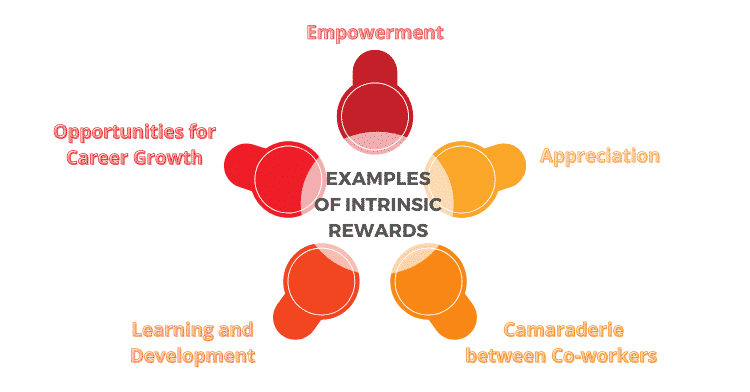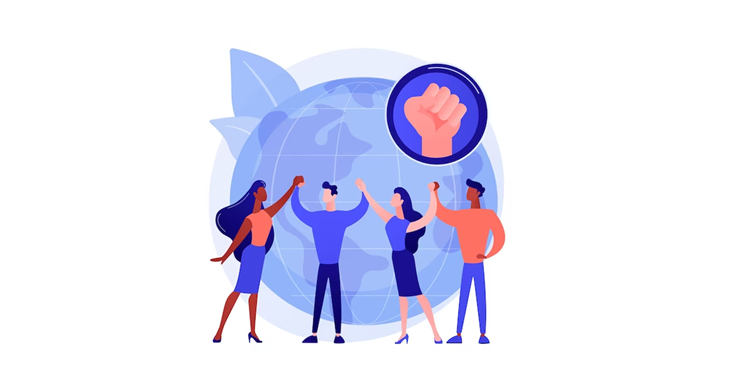1. Intrinsic rewards, such as autonomy, appreciation, camaraderie, career growth, and learning opportunities, are increasingly crucial for employee motivation.
2. They offer longer-lasting benefits than traditional monetary rewards. Unlike extrinsic rewards, intrinsic rewards foster an inner drive in employees, leading to greater satisfaction, commitment, and engagement in their work.
3. Empowering employees, appreciating their contributions, and providing clear career growth paths and opportunities for learning and development further motivate employees, build loyalty, and drive higher performance.
The dynamics of keeping employees engaged and motivated have changed significantly over the past several years. One of the most significant changes in this context has been the growth in the importance of intrinsic rewards, which are increasingly replacing material and monetary rewards.
Organizations are increasingly becoming aware of the fact that traditional rewards such as salary increments, bonuses, and other monetary incentives are no longer enough to keep employees motivated.

Intrinsic rewards are those that come from within the workforce itself and offer the employees a sense of value for the work they do.
These rewards are called intrinsic as they are internal concerning the work being done by the employees and are achieved by their efforts.
Autonomy, sense of purpose, career growth, and learning are some examples of intrinsic rewards.
Extrinsic rewards such as salary increments, bonuses, and other monetary incentives have their limitations.
Their impact does not last long and requires constant stimulus from the organization.
They can also be much more easily outdone by competitors looking for talent as they depend heavily on the available budgets.
Unlike extrinsic rewards, intrinsic ones offer longer-lasting benefits as they have psychological and emotional impacts on the employee.
It gives individuals an inner drive to pursue an activity that makes them feel happy and satisfied, which is their job and its responsibilities.

Keeping their employees engaged and committed to the business objectives is quite challenging, especially in the workplaces of modern times.
Tapping into intrinsic employee rewards is an effective way for organizations to create and sustain a healthy, flourishing, and engaging work culture.
Here are five ways organizations can reward their employees intrinsically to enhance their overall motivation and engagement levels:
1. Empowerment
2. Appreciation
3. Camaraderie between Co-workers
4. Opportunities for Career Growth
5. Learning and Development


At the minimum, most high-performing employees seek greater control of their tasks and projects.
Hence, empowering the employees to take greater responsibility for their jobs and tasks gives them a sense of ownership and pride in their work.
This increased autonomy is considered by many to be equivalent to the best employee recognition they can receive.
Hence, it motivates them to work with total commitment and dedication towards completing their assignments.

Employees, in general, cherish the desire to make a difference in the workplace and be valued for the same.
Organizations can help fulfill this desire of the employees by developing an authentic culture of purpose that provides a rallying point for the employees.
Encouraging employees to find meaning in their work by appreciating and highlighting its impact on the organization’s overall context is a significant first step toward building a highly motivated and purpose-driven workforce.
Once employees understand their work’s importance and roles, they are driven by this sense of purpose. Achievement of goals drives self-fulfillment.

Social interaction with their co-workers can help in building a positive work culture.
Informal activities such as breakout sessions, office parties, team outings, etc., create strong social and emotional connections between co-workers.
Such opportunities for social interaction often prove more effective than any tangible rewards aimed at motivating and engaging the employees.
Hence, organizations should facilitate such opportunities for employees to connect and interact socially; they develop a sense of caring and sharing.

Most employees seek professional growth and success. Providing such opportunities can help enhance employee motivation levels significantly, which, in turn, results in improving their productivity and performance.
Establishing clear career growth paths in the organization can motivate them to perform at a higher level and stretch themselves.
Coaching and mentoring by seniors in the organization can help them achieve their career goals.

Helping employees learn new skills and competencies to enhance their personal and professional growth is one of the best intangible rewards organizations can offer.
Employees feel valued and appreciated knowing that the organization is concerned about their development.
Employees do their best to acknowledge the care and concern the organization demonstrates in their development and well-being.
They develop a more profound sense of loyalty and belonging towards the organization.
This drives higher levels of performance and greater engagement among employees.
Read 10 Best Non-Monetary Awards for Employee Recognition
The importance of intrinsic rewards stems from the fact that they offer an effective and low-cost way for organizations to engage employees and derive longer-lasting benefits.
These intrinsic rewards can create a sense of joy, fulfillment, happiness, and satisfaction among the employees, driving excellent performance.

Lead author: Sagar Chaudhuri, the Co-Founder and CEO of HiFives. He is an HR Tech Evangelist with over 25 years of corporate and entrepreneurship experience. In the past, Sagar has worked in leadership roles with companies such as Genpact, Infosys, and ICICI Bank. He has an engineering degree from IIT Kharagpur and an MBA from IIM Lucknow. Connect on LinkedIn
To stay updated on the latest HiFives blogs, follow us on Twitter (@MyHiFives)